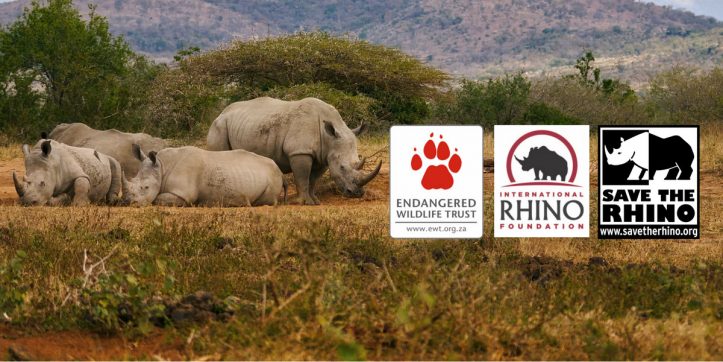
SafariBookings’ 3 Contenders in the Rhino Donation Campaign
 By Heather Joan Marinos
By Heather Joan Marinos 
Heather Joan Marinos is a non-fiction writer and author. Her extensive (30+ years) writing, editing and international marketing experience span a spectrum of industries.
Three conservation organizations – Endangered Wildlife Trust (EWT), International Rhino Foundation (IRF), and Save the Rhino International – will be competing in the SafariBookings Rhino Donation Campaign. The winner will receive a $10,000 donation from SafariBookings and the runners-up will each receive $500.
Each contender is presenting a short pitch (see below) about who they are, the rhino projects they’re working on, and why they deserve your vote. And yes, you – the reader – will determine the winner of this SafariBookings rhino donation campaign! All the pitches (including videos, pictures, and project information) will be shared on our social media channels. So, please let us introduce you to these exceptional conservationists:
A – Endangered Wildlife Trust
Rhinos. The second largest land mammal after the African Elephant, and an integral part of South Africa’s natural heritage. These gentle giants have been around for millions of years and are revered in many cultures. Yet, if poaching is not brought under control, these iconic mega herbivores could be lost forever. The Endangered Wildlife Trust (EWT) is tackling the poaching in a variety of ways:
Canines for Conservation
Dogs aren’t just humankind’s best friend, they’re conservation champions too! We provide trained detection and tracking dogs to support anti-poaching units in parks. These dogs play an integral role. Detection dogs search vehicles at reserve gates for rhino horn, ivory, and ammunition. Tracking dogs are used to follow incursions into the reserve, and can also be used to track poachers away from a poaching scene. We’ve even had cases of poachers surrendering on sight when they encounter one of our dogs! Now that’s definitely something to bark about!
Knowledge Is Power
Capacity-building is a critical component of the war against poaching. The EWT provides training to law enforcement officials, rangers, and anti-poaching units to support their efforts to combat rhino-related offences at various levels.
The Future Is Now
The EWT also believes in the innovative use of technology to support anti-poaching efforts. A truly South African app developed by our partner, the Council for Scientific and Industrial Research, allows for more efficient collection of wildlife-related data, such as animal sightings – as well as crime-related information such as evidence of potential poaching incursions.
B – International Rhino Foundation
Rhinos face an uncertain future. Record levels of poaching and habitat loss threaten rhinos with extinction – as well as their surrounding communities. The International Rhino Foundation is dedicated to the survival of the world’s rhino species through conservation and research. For 25 years, the IRF has championed the survival of the world’s rhinos through conservation and research. All five living rhino species (Black, White, Greater One-Horned, Sumatran, and Javan) are in terrible peril – from poaching, forest loss, and habitat conversion. And also from human settlements encroaching on their habitats in Africa, Indonesia, and India, and from the effects of living in small, isolated populations that can’t get together to breed. IRF protects particularly threatened rhino populations and their habitats in the wild, while also supporting management and applied research that can help improve the chances for the long-term survival of rhinos.
Current Programs
IRF’s current major programs include: 1) Indonesia: Rhino Protection Units, the Sumatran Rhino Sanctuary, and the Javan Rhino Study and Conservation Area; 2) India: Indian Rhino Vision 2020; 3) Zimbabwe: Lowveld Rhino Conservation Program; and 4) Southern Africa: Operation Stop Poaching Now. IRF also supports scientific research, providing grants for work that is directly applicable to management, propagation, and conservation of rhino species in nature and in breeding centers.
Your Support Counts
Through the support of concerned citizens around the globe, IRF is able to maintain a very small staff – this lean structure allows more than 92% of its funds to go directly to its field programs. We do what it takes to ensure that rhinos survive for future generations.
C – Save the Rhino International
At Save the Rhino, we want to see all five rhino species thriving in the wild. We know that rhino poaching has reached crisis point, and across the globe rhino habitat is shrinking. It’s shocking that today, three of the five species of rhino are critically endangered, and two of them have fewer than 80 animals left in the wild. The good news is that we believe we can stop poaching and habitat loss so that in 20 years’ time, rhinos will no longer be critically endangered. To achieve our ambitions, we’re working with the best people and projects to protect rhinos.
Savin Rhinos and Growing the Global Population Is Our Top Priority
Our top priority is saving rhinos and growing the global population. At the heart of our work is supporting the heroes in the firing line – rangers. We’re championing community-led conservation, so people living near rhinos are inspired to protect wildlife too.
Across the world we’re sharing information, so that conservationists have the best skills possible to tackle the illegal trade in rhino horn at every point in the chain, including its root cause: consumer demand. We’re stopping people from wanting to buy horn in the first place, and gaining insights to help lock up the criminals involved. And we always make sure that our funding is used wisely and makes the biggest impact possible on rhinos. We know we can’t achieve any of this alone. We need rhino supporters like you to join us. Can we count on your vote?
Get Ready To Vote for Your Favorite Rhino Organization
The rhino donation campaign pitches (and supporting materials) presented by each of our top 3 conservation organizations can be found on SafariBookings social channels – our Facebook page, Instagram account and blog. Voting will commence on December 4th 2017, at noon (underneath a dedicated Facebook and Instagram post) where you can vote for organization A, B, or C. This post will be pinned to the top of SafariBookings’ Facebook account, and is easy to find on the Instagram account. Voting will last until noon, Monday, December 18th 2017. Official rules apply. We look forward to seeing which African wildlife conservation organization you will choose. The decision won’t be easy. They’re all phenomenal! And they need our support, so please VOTE!
Want To Go on an African Safari?
Click on the button below to compare African safaris offered by top-rated tour operators.
 By Heather Joan Marinos
By Heather Joan Marinos  US
US
Heather Joan Marinos is a non-fiction writer and author. Her extensive (30+ years) writing, editing and international marketing experience span a spectrum of industries.
More About This AuthorAfrican Safari Tours
-
![4-Day Thrilling Tanzania Safari]()
4-Day Thrilling Tanzania Safari
$1,350 pp (USD)
Tanzania: Private tour
Mid-range Lodge & Tented CampYou Visit: Arusha (Start), Tarangire NP, Serengeti NP, Ngorongoro Crater, Lake Manyara NP, Arusha (End)

Safari360
4.8/5 – 131 Reviews
-

3-Day Serengeti & Ngorongoro Adventure Tour
$1,100 pp (USD)
Tanzania: Private tour
Mid-range Tented CampYou Visit: Arusha (Start), Central Serengeti NP, Ngorongoro Crater, Tarangire NP, Arusha (End)

Migration Venture Africa
4.8/5 – 392 Reviews
-
![11-Day Tanzania Safari with Zanzibar Beach Break]()
11-Day Tanzania Safari with Zanzibar Beach Break
$9,199 to $12,299 pp (USD)
Tanzania: Private tour
Mid-range Lodge & Tented CampYou Visit: Arusha (Start), Tarangire NP, Lake Manyara NP, Ngorongoro Crater, Serengeti NP, Zanzibar (End)

Wayfairer Travel
4.8/5 – 185 Reviews



 Subscribe to our newsletter
Subscribe to our newsletter
 Follow us on Instagram
Follow us on Instagram





